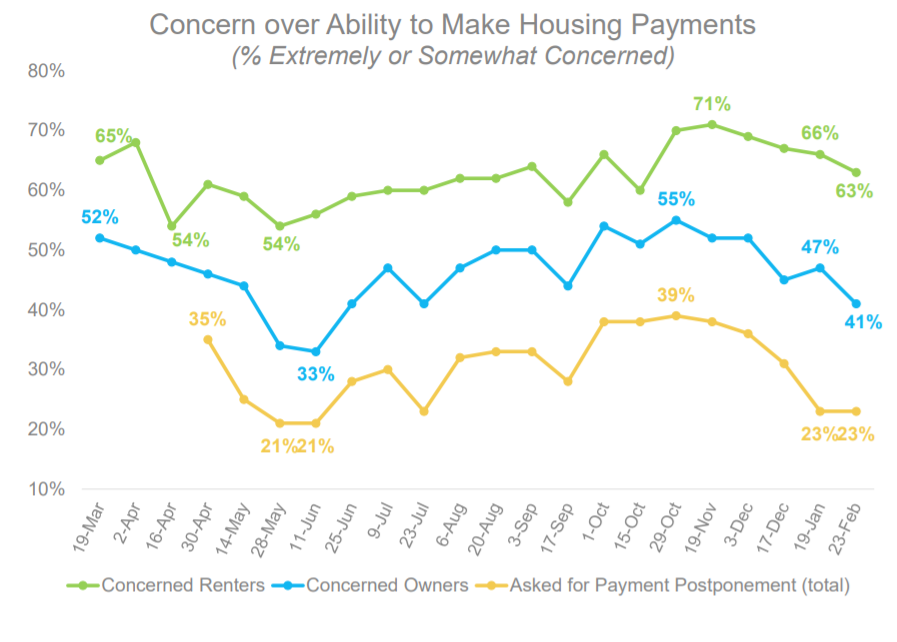 Concerns amid the pandemic and its impact on the nation lingers, as new research from Freddie Mac finds that Americans are still uncertain about the ability to repay their mortgage and/or rent. The survey, of which two-thirds of respondents are homeowners and one-third are renters, shows that although homeowners and renters continue to feel great economic depression due to the pandemic.
Concerns amid the pandemic and its impact on the nation lingers, as new research from Freddie Mac finds that Americans are still uncertain about the ability to repay their mortgage and/or rent. The survey, of which two-thirds of respondents are homeowners and one-third are renters, shows that although homeowners and renters continue to feel great economic depression due to the pandemic.
Throughout 2020, more than half of surveyed renters remained concerned about their ability to make housing payments, fluctuating between 54% (April) and 71% (November). In December, renter concern showed a slight improvement at 67% and dropped to 63% in February 2021. Meanwhile, over the course of 2020, homeowner concern about making payments fluctuated between 33% (June) and 55% (October), ending the year at 45%. Those numbers have further improved to 41% in February 2021. As of December 2020, 27% of homeowners and 35% of renters had asked for a housing payment postponement, most commonly due to uncertainty over making payments beyond the next one. By February of this year, those numbers dropped to 19% of homeowners and 28% of renters.
Black Knight's latest McDash Flash Forbearance Tracker reports that forbearance activity dropped below 2.6 million for the first time since last April. As of mid-March 16, 2.59 million homeowners remain in forbearance programs, a share of 4.9% of all homeowners with mortgages.

“The pandemic has been economically devastating for millions of Americans, and those who rent have been hit the hardest,” said Debby Jenkins, Executive Vice President and Head of Multifamily Business at Freddie Mac. “In the early days of the pandemic, we acted quickly to help remove the threat of eviction for residents of the more than 4.2 million multifamily units we helped finance, and that protection is ongoing for nearly 100,000 families as a result of our multifamily forbearance program.”
Confidence in the housing market fluctuated between 48% (April) and 69% (October) but remained high overall, averaging 60% in all of 2020. As of February 2021, confidence has improved to 66%. During 2020, renters were more likely than existing homeowners to buy homes, with many shifting into homeownership through the late summer and early fall, taking advantage of record-low rates to achieve homeownership.
Short supply and high demand is creating a competitive marketplace, one where cash is king according to a new study, which found that a prospective buyer's chances nearly quadruple, raising their odds by 290% if offering all-cash.
The likelihood of homeowners to sell their homes (18%) and renters looking to purchase a home (34%) has held steady since the beginning of 2021. Likewise, refinance activity remains strong, with nearly a third of homeowners indicating they were likely to refinance their home within the first six months of this year.
While many homeowners and renters are struggling financially, Fannie Mae found that 72% of currently employed respondents were confident they will maintain the same level of income through the first half of this year. As of February 2021, 43% of respondents were living payday-to-payday and had just enough to get by, while 17% didn’t have enough for the basics until the next payday. Forty percent cited that they had enough to go beyond payday.

 theMReport.com Your trusted source for mortgage banking news
theMReport.com Your trusted source for mortgage banking news








